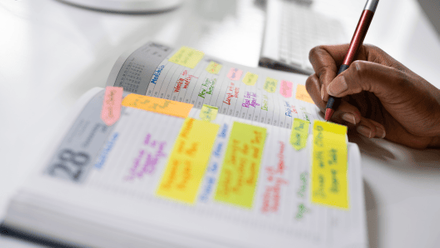Work-life balance
On average, we will spend at least one third of our lives at work. This is not a bad thing! Work is important for many reasons.
Evidence shows that a healthy work life, i.e. the work we do and role we play at work, is good for our physical and mental wellbeing. It helps to build strong social connections, which in turns give us a sense of purpose and meaning, and it is a means to support ourselves and our families, providing us with a sense of self-sufficiency and ownership over our life.
However, with improvements to digital communication and remote working growing in popularity, it has become more challenging to navigate and maintain a healthy work-life balance.
In this article we will look at what work-life balance is, why it matters and share some top tips to creating a better relationship with work.
What is work-life balance?
Work-life balance can mean different things to different people. Most definitions describe it as ‘achieving a balance between inside and outside work activities’ or ‘between a personal and work whilst at the same time doing a good job at work and maintaining a healthy happy life at home.’ Work-life balance focuses on keeping your personal and work life separate and equally balanced.
Why does work-life balance matter?
Over the last few years, work-life balance and wellbeing have become hot topics of discussion. This is true also in the early education and care sector. Working with young children can be fulfilling and rewarding, but it can also be an emotionally and physically demanding career. High work demands and long hours remain major issues, leading to increased levels of stress and burnout.
Whilst it’s admirable and desirable to have a passion for your work, it is equally important to establish boundaries between work and your personal life. Making time to relax, switch off and look after ourselves is key to maintaining your mental and physical health and to providing the best care and education to the children you look after.
How can you achieve better work-life balance?
Start by taking some time out to reflect on what’s important to you, not only in your work but also more broadly in your life. The Mental Health Foundation suggests regularly checking your work-life balance by taking the following five steps:
- Pause and reflect on what your priorities are, what works well and where you could improve. This can help you take notice and tackle the potential barriers to achieving a better balance.
- Pay attention to your feelings. Do you feel happy and fulfilled, or overwhelmed and exhausted? Being in tune with your feelings can help you decide what steps you need to take next.
- Reprioritise. Work-life balance shouldn’t be about making constant compromises between your work and home life. Think about what you could do to improve this. This could mean setting clear boundaries, such as not taking work home, not reading emails on your days off, etc.
- Consider your alternatives. What can change at work to meet your new(found) priorities? Creating a to-do list and ranking your tasks can help to prioritise your new goals and think with a new perspective of what matters to help you achieve the balance you need.
- Take action. Be intentional about making a change by choosing realistic goals and small actions that you can commit to. Trialling different approaches is a safe way to experiment and to find what works best for you. Don’t be afraid to change things up! Marginal gains are a great way to achieve a lot by doing little – have a look at the ways you could make small changes to your day to implement moments that make you smile in your working day. Remember: self-care is essential for caring for others.
Key takeaways
It can be challenging to establish work-life balance practices, but ensuring we maintain a healthy balance can help us flourish in everything that is important to us.
Keep this information handy with our Top tips for maintaining a healthy work-life balance - Infographic
For more in depth reading, take a look at:
CIPD Good Work Index Report 2024






